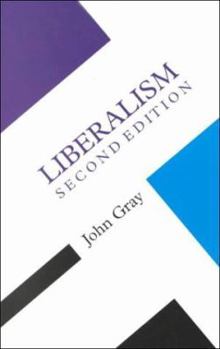Liberalism (Concepts in Social Thought)
Select Format
Select Condition 
Book Overview
Since the publication in 1986 of the first edition of Liberalism, both the world and the author's views have changed significantly. In this new edition, John Gray argues that whereas liberalism was the political theory of modernity, it is ill-equipped to cope with the dilemmas of the postmodern condition. The task now, as Gray sees it, is to develop a pluralist theory, in which the liberal problem of finding a modus vivendi among rival communities and worldviews is solved in postliberal terms.
Copublished with Open University Press
Format:Paperback
Language:English
ISBN:0816628017
ISBN13:9780816628018
Release Date:September 1995
Publisher:University of Minnesota Press
Length:128 Pages
Weight:0.41 lbs.
Dimensions:0.4" x 5.3" x 8.5"
Customer Reviews
2 ratings
A Short and Useful Introduction to the Historical and Philosophical foundations of Classical Liberal
Published by Thriftbooks.com User , 18 years ago
The book begins with an introduction in which the author lays out four basic characteristics of liberalism: 1) Individualist - it asserts the moral primacy of the person against the claims of any social collectivity 2) Egalitarian - it confers on all men the same moral status and denies the relevance to legal or political order of differences in moral worth among human beings 3) Universalist - it affirms the moral unity of the human species and according to a second importance to specific historic associations and cultural forms 4) Meliorist - it affirms the corrigibility and improvability of all social institutions and political arrangements The book is then divided into two parts: part one deals with the historical development of liberalism and part two deals with some of the philosophical issues associated with liberalism. The first part covers the pre-modern and early modern precursors of liberalism (which were of less interest to me), the characteristics of the liberalism of the Enlightenment period (mainly the 18th century), the liberalism of the Liberal Era (mainly the 19th century), the fall of liberalism (in the early and mid 20th century) and its revival (in the late 20th century). The liberalism of the Enlightenment period stressed the equal and natural rights of all men. While it believed that government should guarantee these rights (i.e., freedom of press, freedom of speech, private property, etc.), it generally proposed a limited role of government and stressed the importance of a free-market economy (i.e., free trade, low taxation and low public expenditure). The argument was that political freedom was inherently dependent on economic freedom. Enlightenment liberalism also emphasized reason over superstition and religious fanaticism, taking on a particularly anti-clerical character in countries where the Catholic Church had a very strong presence. In the liberal era (19th century), however, there was a transition from classical liberalism to modern/revisionary liberalism, the latter expanding on the role of government. Jeremy Bentham (most famous for his conception of the panopticon prison) and John Stuart Mill were key figures in this transition. Bentham's philosophy of Utilitarianism promoted the idea that social institutions could improve society and led to attempts at social engineering. Mill advanced the idea that government ought to correct some of the injustices that occur in the free market system. These changes, combined with the competition of popular democracy (the public voting against liberal policies) and the general disillusionment caused by WWI and WWII, led to the rise of the ideas of J. M. Keynes who sought to correct the injustices of capitalism with government intervention. Nevertheless, in the 1970s classical liberalism returned as the ideas of Friedrich Hayek found a voice in Margaret Thatcher in England and Ronald Reagan in the US. Following Hayek's argument that socialist economic policie
Excellent book to start with....
Published by Thriftbooks.com User , 24 years ago
I find this book excellent intraduction in liberalism. The book is devided in two parts, historical and philosophical. Both parts are written very informativly. Author gave a good historical and philosophical review of liberalisam. He gave distinction between English and European liberalism and I find his explanation of maior political philosophy terms and explanation of teaching of maior liberalsm's theoreticians very good. I would recoment this book to all those who want to know more about liberalism especially to the students. I find out bibliograpy that autor gave very inspiring for further reading.






